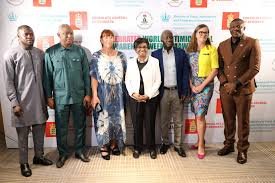Flowerbud News
As Antimicrobial Resistance (AMR) continues to pose a major threat in the fight against infections, NAFDAC has called for coordinated national and international solutions to address the issue.

Prof. Mojisola Adeyeye, the Director- General of the National Agency for Food and Drug Administration and Control (NAFDAC), made the call in Lagos.
She spoke at a programme organised in collaboration with the Royal Danish Embassy and the Denmark Ministry of Environment and Food, to commemorate the 2024 World Antimicrobial Awareness Week (WAAW) on Friday.
The News Agency of Nigeria (NAN) reports that WAAW is observed every Nov. 18 to Nov. 24 globally, to raise awareness and understanding of AMR and reduce the emergence and spread of drug-resistant infections.
AMR occurs when bacteria, viruses, fungi and parasites no longer respond to antimicrobial agents as a result of drug resistance.
The theme for WAAW 2024 is “Educate. Advocate. Act now”.
Adeyeye said:” Antimicrobial resistance is not a distant threat; it is already impacting our lives.
“Infections which were once easily treated with antibiotics, antivirals, and antifungals are now becoming increasingly difficult and sometimes impossible to manage.
“With decades of medical progress, potentially reversing our success in treating common infections, performing surgeries, and conducting medical procedures, and the most pressing danger is the resistance found at birth in the new-born babies.
“The implication of AMR to human race is unquantifiable because it poses threat to man, animal, and plant, so as we we mark this important week, which has now become the Agency’s tradition, we recognise that AMR respects no borders.
“It is a global issue requiring coordinated national and international solutions and together, we must commit to the responsible use of antibiotics and other antimicrobials to safeguard these essential resources for future generations”.
Adeyeye said the agency, having identified the danger posed by AMR, developed several mechanisms to combat the resistance often refer to as “Silent Pandemic”.
According to her, some of the mechanisms include, review of the formulation of antibiotics, ban on the use of growth promoter in livestock production and ban on the use of colistin as coccidiostat in poultry and swine product.
“Others are ban on the use of antibiotics as mould inhibitor and the creation AMR–OH committee that collaborates with other sister agencies such as Nigeria Centre for Diseases Control, Federal Ministry of Agriculture and Food Security, Ministry of Health , foreign partners and more”.
The D-G, however, commended the Royal Danish Embassy for its unwavering support to the agency in attending to the challenges posed by AMR and for supporting the agency in the area of human development.
“We are grateful for the partnership between the Danish Embassy and NAFDAC; this has been of immense contribution to NAFDAC.
“The embassy has trained 50 staff of the agency and supported the agency in other areas and we look forward for their continuous partnership,” she said.
Speaking also, the Danish Ambassador to Nigeria, Jens Ole Bach Hansen, said that Denmark, over the years ,had been a frontrunner in addressing the threat posed by AMR, noting that the country established a joint monitoring programme for humans and animals in 1995.
Hasen described AMR as one of the greatest challenges confronting the global public health adding that it required global solutions.
The ambassador reiterated the commitment of the Danish government to support and collaborate with Nigeria to ensure public health safety.
“This partnership with NAFDAC signifies a very close cooperation between Denmark and Nigeria, but also very much between NAFDAC, the Ministry of Agriculture, and the Danish Embassy and Consulate General.
“Denmark has operated within a national action plan for antimicrobial resistance,nd a new action plan will be developed during the coming year, 2025. (1:44) However, antimicrobial resistance is a global health challenge.
“Denmark has operated within a national action plan for antimicrobial resistance and our collaborations with NAFDAC runs within the Strategic Sector Cooperation.
“It focuses on capacity development and transfer of experiences between the authorities on matters of food safety and sustainable livestock production.
“We have agreed to collaborate, particularly in three focus areas, food and feed safety and management, animal identification and traceability, and disease control and prudent use of veterinary drugs.
“This collaboration is also complemented by a learning programme by the NIDA Fellowship Center, where Nigerians are provided with training in related topics, such as food safety, disease control, and one health approaches,” he said.
NAN












